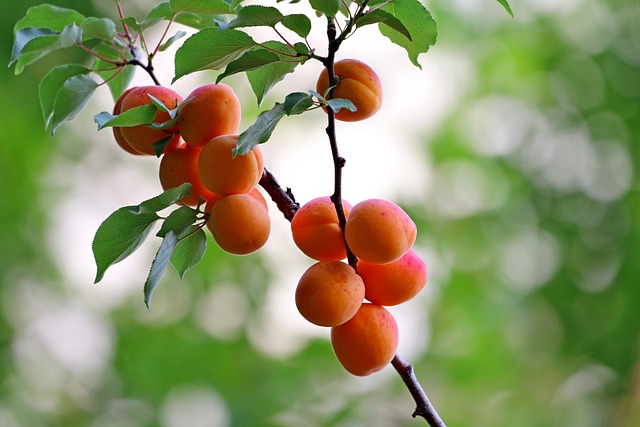Latvia could be said to be the extreme northern border where apricots are being grown. Apricot is, of course, a demanding and capricious tree, but Latvian growers have slowly learned to grow it here as well. Perhaps you will notice peach trees in the gardens more often.
Apricot is a small fruit tree or a large bush up to 5-8m tall (up to 17m), trunk diameter up to 50-60cm. The bark of old trees is light brown, longitudinally cracked. Young shoots bare, shiny, reddish brown. The leaves are arranged alternately, round or ovate. Up to 6-9 cm in length. Flowers white or pink, single or in small bunches 2.5-3 cm in diameter, sessile or on short flower stalks.
Fruit - a round, juicy drupe with a diameter of 3-3.5 cm, from white to red-orange color, velvety hair, usually with a one-sided, red "tan".
The pulp is juicy and sweet for cultured forms, drier, fibrous and strongly bitter for wild forms. For wild forms, the fruit is usually up to 20 gr., for cultured forms up to 80 gr.
Apricot blooms in March-April, before the leaves appear, the fruits ripen in July-September, depending on the variety.
Apricot can withstand severe droughts and does not require additional watering. However, you should know that the tree is long-lived and lives up to 100 years, which is not so little for fruit trees.
In the spring, it is desirable to additionally fertilize the tree. It should be noted that the apricot is not resistant to frost, therefore it is worth covering its roots and sometimes even the tree itself for the winter.
Apricot fruits are harvested by hand, do not try to shake the tree. Apricot wood is special and when subjected to a stronger load, it can easily split and break. This also applies if you plant it in a windy area. In addition, fruits that have hit the ground will quickly begin to spoil, if only they are supposed to be processed immediately, without storage.
Ripe apricot fruits are yellow-orange in color, up to 4 cm in diameter. Apricot fruit must have a strong aroma, and you can tell when the fruit is ripe. When you tear open the fruit, the flesh is firm but not hard.
The collected fruits are placed in small cardboard or wooden boxes to reduce the possibility of bruising them. Apricots that are to be dried are harvested a little later and treated with sulfur oxide. Drying is done in the sun or in forced dryers.
Properly harvested apricot fruits are stored for no longer than 1-2 weeks, after which they will begin to deteriorate. Apricot fruits are harvested from July to mid-August, but this is directly related to the place where the apricot is grown.
Apricots contain sugar, acids, flavonoids, nitrogen compounds, pectins, fibers, alkalis and water.
Sucrose (2-15%), glucose (0.13-3.4%), fructose (0.065-3%) and maltose in insignificant amounts. There are varieties of apricot whose fruits also contain starch.
Apricot fruits contain malic acid, citric acid and tartaric acid in small amounts, an insignificant amount of salicylic acid has been found. Also, the fruits also contain a significant amount of pectins, they are especially valuable when preparing various jellies, lozenges, marmalade or candy fillings.
Apricot seeds contain vegetable fat (<57%), protein (<28%), fiber (<3.5%), alkali (<27%), carbohydrates (12%), water (17%). The bitter seed also contains amygdalin (<8.5%).
According to research, apricot fruits are ahead of most garden-grown fruits in terms of vitamin and mineral content. Apricot fruits contain a lot of vitamin A, as well as vitamins B1, B2, PP and C. The fruits also contain potassium, magnesium, phosphorus, iron, calcium, sodium, copper, manganese, nickel, titanium, molybdenum, strontium, boron, aluminum. The iron content should be especially highlighted, it is 40mg per 100g of fruit.
Medicinal significance
Thick deposits and decoctions of dried apricots are used as a diuretic in case of edema. They are also used in complex therapies to treat cardiovascular and kidney diseases.
Oil is made from apricot seeds, which is very close to almond and peach oil in terms of its properties. Apricot oil contains ~20% linoleic acid, 14% stearic acid and 5% myristic acid. Such oil does not tend to dry out, but is resistant to sunlight and oxygen - it remains bitter. Apricot oil is what is used to make fat-soluble medications that are meant to be used under the skin or injected into a muscle.
Apricot curds-gums are used to produce blood substitute liquids, tablets and capsules. In oriental medicine, apricot seeds are used to treat bronchitis, laryngitis, tracheitis and bronchial asthma.
In folk medicine, apricot fruits are used to treat constipation. 200 grams of fruit will be enough to fix the bowels. Fruits are also useful in case of anemia, they will increase the hemoglobin content in the blood.
Dried apricot fruits are used as diuretic and blood pressure lowering agent.
Wild apricots are recommended for the treatment of arrhythmia, myocardial infarction, insufficient blood circulation.
